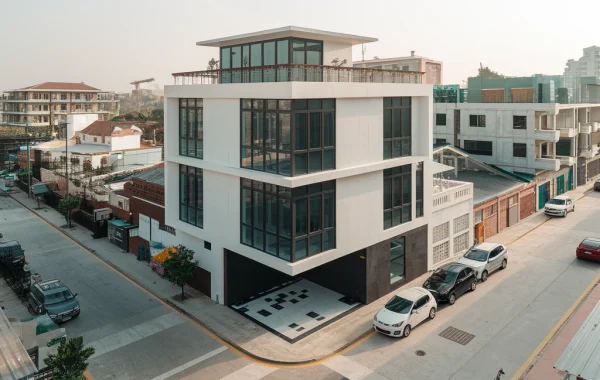
Property Rights and Ownership in Ghana: What You Need to Know
You’ve fallen in love with a beautiful plot of land overlooking the coastline near Accra, or perhaps you’ve found the perfect apartment in a luxury development like Eden Heights. The location is perfect, the price seems right, but then comes the crucial question that keeps many potential property buyers awake at night: Do I actually own this property, and what rights do I have as an owner?
If you’re contemplating property investment in Ghana, understanding the intricacies of property rights and ownership isn’t just advisable—it’s essential. Ghana’s land tenure system is fascinating yet complex, rooted in both traditional customs and modern statutory law. Getting it wrong could mean the difference between a solid investment and a costly legal nightmare that drags on for years.
Understanding Ghana’s Unique Land Ownership Landscape
Ghana’s property ownership system is quite unlike what you’d find in many Western countries. Eighty percent of the land in Ghana is owned through customary law, with the remaining twenty percent governed by formal statutory measures. This means that most of the land you’ll encounter operates under traditional systems that have been in place for centuries.
The country recognises four main types of land ownership, each with its own set of rules and procedures:
- Stool and Skin Lands represent the largest category, making up the majority of that 80% customary land. These are managed by traditional authorities—chiefs known as “stools” in southern Ghana and “skins” in the north. The Stools manage them as a fiduciary duty on behalf of the larger communities, in collaboration with the Principal Eldest. When dealing with stool lands, you’re not just buying from an individual—you’re agreeing with a traditional institution that represents an entire community.
- Family Lands are controlled by family heads working alongside principal family members. These properties have often been passed down through generations, and purchasing them requires careful verification that you’re dealing with the legitimate family head who has the authority to make such transactions.
- State Lands represent properties acquired by the government, where all interests are extinguished, and this type of land can only be granted by the State. These tend to be more straightforward transactions but are typically reserved for commercial or industrial purposes.
- Private Lands are properties that individuals have acquired over the years and now hold as self-acquired property. The key here is ensuring they’re free of encumbrances—a lesson many investors have learned the hard way.
The Critical Distinction: Freehold vs Leasehold in Ghana
Here’s where things get particularly interesting for foreign investors. Under the 1992 Constitution, any person who is not a Ghanaian citizen may not hold a freehold or higher interest in land in Ghana. This constitutional provision fundamentally shapes how foreign investment works in the country.
For Ghanaians, the options are more generous. Land laws in Ghana allow foreign citizens to lease land for a maximum of 50 years, while Ghanaian citizens are allowed to lease land for up to 99 years. This difference reflects the country’s commitment to protecting national interests whilst still welcoming foreign investment.
But here’s what many people don’t realise—even for Ghanaians, the 1992 Constitution, by article 267 (5) forbids the creation of freehold interests in stool land in Ghana. This means that the vast majority of land transactions in Ghana, regardless of your nationality, will be leasehold arrangements.
The leasehold system isn’t necessarily a disadvantage. A well-structured 50-year lease with renewal clauses can provide substantial security for your investment. Many successful property developments, including luxury complexes like Eden Heights, operate on leasehold arrangements that offer investors peace of mind and strong returns.
Navigating the Lands Commission: Your Gateway to Secure Ownership
The Ghana Lands Commission serves as the central authority for land administration and has undergone significant modernisation in recent years. From 1st October, 2021, the Lands Commission, Greater Accra Region, no longer issues separate search reports from its divisions. Records from these divisions are consolidated into one Lands Commission search report.
This consolidation was a game-changer for property buyers. Previously, you’d need to obtain separate search reports from multiple divisions—a process that was both time-consuming and expensive. Now, all applications for searches should be submitted online through https://onlineservices.lc.gov.gh, making the verification process more efficient and transparent.
The Commission’s recent digitalisation efforts represent a significant step forward. The Lands Commission, as part of its digitalisation drive, has established a modernised land record management system, including scanning, geo-referencing, digitising and archiving of existing records. This technological advancement helps reduce the risk of fraudulent documentation and makes it easier to verify property titles.
When conducting your due diligence, a comprehensive land search through the Commission will reveal crucial information about your prospective property: its exact location and size, the rightful owner, whether it’s subject to any disputes, and whether your intended use is permitted. This search is absolutely non-negotiable—land litigation accounts for about 80% of all cases in the Ghana High Courts.
Common Legal Pitfalls and How to Avoid Them
Property investment in Ghana isn’t without its risks, but most problems are entirely avoidable with proper preparation. The most common issue investors face is title disputes, often arising from incomplete due diligence or dealing with unauthorised parties.
One investor I know purchased what he thought was a prime plot near East Legon, only to discover months later that he’d been dealing with someone who didn’t have the authority to sell the land. The family head who actually controlled the property had never consented to the sale. What followed was three years of legal battles and considerable financial loss.
Land disputes have been common in Ghana, often leading to conflicts in rural areas where local chiefs manage land issues based on traditional laws, making it essential to verify land titles with the Lands Commission before purchasing. The complexity arises because traditional and statutory law systems sometimes operate in parallel, and understanding which takes precedence in your specific situation requires expert guidance.
Another common pitfall involves dealing with fraudulent documentation. Fraudulent land sales are a real concern, as the market’s complexity and lack of accessible information make it tough to confirm legitimate titles. This is precisely why working with reputable developers who have already navigated these complexities can save you considerable time and risk.
Special Considerations for Foreign Investors
Foreign property ownership in Ghana comes with specific requirements that differ significantly from what you might expect in other markets. Beyond the 50-year leasehold restriction, any agreement that purports to convey a freehold interest to a non-citizen is void.
There’s also an interesting provision regarding corporate ownership. The Land Act now specifies what counts as a non-Ghanaian company or corporate body, defined as a corporation when non-Ghanaian citizens possess more than 40% of the shareholding or ownership. This means that foreign investors looking to use corporate structures for their property investments need to carefully consider their ownership percentages.
For commercial property investments, foreign citizens who wish to buy commercial properties should register with the Ghana Investment Promotion Centre (GIPC). This additional step ensures compliance with investment regulations and can provide access to certain incentives.
The good news is that the process for foreigners mirrors that for Ghanaians in most respects. Purchase processes are the same for foreigners as for Ghanaians, with foreigners able to buy freehold interests and leaseholds available for up to 50 years.
Recent Legal Reforms Strengthening Property Security
Ghana has been actively modernising its property laws to create a more secure and transparent investment environment. Ghana passed a land law, the Land Act, 2020 (Act 1036), which revised, harmonised, and consolidated laws on land to ensure sustainable land administration and management.
This comprehensive reform introduced several investor-friendly provisions. The new law makes it possible to transfer and create interests in land electronically, significantly speeding up conveyancing processes. It also supports decentralised land service delivery and includes important provisions relating to the property rights of spouses.
The commission would also embark on a “You Deserve To Know” campaign to help restore public trust in the land administration body, following concerns about corruption within the system. These transparency initiatives, combined with the digital reforms, are creating a more trustworthy environment for property investment.
The modernisation efforts extend to the physical infrastructure as well. Vice President, Dr. Mahamudu Bawumia, has commissioned an ultra-modern head office complex in Accra for the Lands Commission, symbolising the government’s commitment to improving land administration services.
How Eden Heights Ensures Secure Property Investment
At Eden Heights, we understand that navigating Ghana’s property laws can feel overwhelming, especially for first-time investors. That’s why we’ve built our entire development process around compliance and transparency. Every aspect of our luxury residential development has been carefully structured to provide maximum security for our investors.
Our legal team conducts comprehensive due diligence on all land acquisitions, ensuring a clear title and proper documentation before any development begins. We work exclusively with registered surveyors and maintain ongoing relationships with the Lands Commission to ensure all our properties meet current legal requirements.
For foreign investors, we structure our leasehold agreements to include renewal clauses and clear terms that protect your investment for the full 50-year term. Our in-house legal experts guide you through every step of the purchase process, from initial property searches to final registration.
Located conveniently behind West Hills Mall, Eden Heights operates under properly verified land rights, giving our residents peace of mind that their investment is legally sound. Our properties range from elegant two-bedroom apartments to luxurious penthouses, all backed by comprehensive legal documentation and transparent ownership structures.
Key Takeaways for Secure Property Investment
Understanding property rights in Ghana doesn’t have to be intimidating when you know what to look for. The key is working with reputable developers who have already navigated the legal complexities and can guide you through the process.
Always conduct thorough due diligence through the Lands Commission, regardless of how trustworthy the seller appears. Insist on seeing all relevant documentation and ensure that any traditional authorities involved have provided proper consent. Work with qualified legal professionals who understand both customary and statutory law.
Remember that leasehold ownership, when properly structured, can provide excellent security and returns. Many of Ghana’s most successful property developments operate on leasehold arrangements, and with proper renewal clauses, your investment can provide long-term value.
The legal reforms and digitalisation efforts currently underway are making property investment in Ghana more secure and transparent than ever before. By understanding the system and working with compliant developers, you can confidently invest in one of Africa’s most promising property markets.
Frequently Asked Questions
1. Can foreigners own property outright in Ghana?
No, foreigners cannot own land outright in Ghana. The 1992 Constitution restricts foreign ownership to leasehold interests only, with a maximum term of 50 years. However, foreigners can own buildings and structures on leased land, and leasehold agreements can include renewal clauses.
2. How long does it take to complete property registration in Ghana?
The Lands Commission has streamlined processes significantly, with online applications now possible through their digital portal. While completion times vary depending on the complexity of the transaction, the Commission is working to reduce processing times to 30 working days, though current timelines may be 90-140 days for complex cases.
3. What’s the difference between customary and statutory land ownership?
Customary land (80% of Ghana’s land) is governed by traditional authorities and local customs, while statutory land follows formal government procedures. Both types require proper verification through the Lands Commission, but customary land transactions may involve additional negotiations with traditional authorities.
4. Is it safe to buy property directly from families or chiefs?
While it’s possible, it requires extensive due diligence. You must ensure you’re dealing with the legitimate family head or authorised traditional authority, and all transactions should be verified through the Lands Commission. Working with established developers who have already completed this verification process significantly reduces risk.
5. What happens when my 50-year lease expires?
Leasehold agreements typically include renewal provisions. The renewal process depends on the specific terms in your lease agreement and the consent of the landowner. Well-structured leases include automatic renewal clauses or first right of refusal for lease extensions, providing security for long-term investment.
Ready to invest in Ghana’s property market with confidence? Eden Heights offers luxury residential properties with full legal compliance and transparent ownership structures. Our expert team handles all legal complexities, ensuring your investment is secure from day one. Contact our property specialists today to schedule a consultation and discover how Eden Heights can help you make a sound, legally protected property investment in Ghana’s thriving real estate market.


